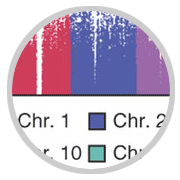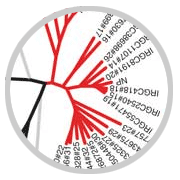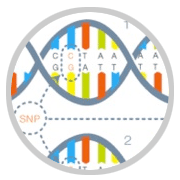Our group is interested in Computational Genetics. We develop and apply techniques from Computer Science, Statistics, and Bioinformatics to understand the relationship between genetic variation and traits. Our publications present novel methods for solving the challenging computational problems that arise in attempting to understand the genetic basis of human disease.
 GENOME-WIDE ASSOCIATION STUDY (GWAS)
GENOME-WIDE ASSOCIATION STUDY (GWAS)
A GWAS seeks to identify specific genetic variants that are involved in disease development and progression. Association studies discover variants implicated in a disease by correlating the genetic variation of individuals with a disease status or disease-related trait. Our lab develops software packages for detecting and testing the significance of variants in association studies of human datasets. Relevant blog posts:
- Fine Mapping Causal Variants and Allelic Heterogeneity
- Widespread Allelic Heterogeneity in Complex Traits
- Selection in Europeans on Fatty Acid Desaturases Associated with Dietary Changes
- Incorporating prior information into association studies
- Characterization of Expression Quantitative Trait Loci in Pedigrees from Colombia and Costa Rica Ascertained for Bipolar Disorder
- Simultaneous modeling of disease status and clinical phenotypes to increase power in GWAS
- Efficient and accurate multiple-phenotype regression method for high dimensional data considering population structure
- Review Article: Population Structure in Genetic Studies: Confounding Factors and Mixed Models
- Colocalization of GWAS and eQTL Signals Detects Target Genes
- Chromosome conformation elucidates regulatory relationships in developing human brain
 MOUSE MODELS OF HUMAN DISEASE
MOUSE MODELS OF HUMAN DISEASE
The mouse is an excellent model organisms for human disease trait mapping. Mice have a relatively short breeding time and well established sets of inbred strains, which allow us to replicate genetic effects over and over again. However, the complex genetic relationships between mouse strains are a challenge in mouse GWASs. We also develop tools for the analysis of mouse genetics. Relevant blog posts:
- Review Article: The Hybrid Mouse Diversity Panel
- Genes, Environments and Meta-Analysis
- Review Article: Mixed Models and Population Structure
- Identifying Genes Involved in Blood Cell Traits
- Genes, Diet, and Body Weight (in Mice)
- Review Article: Mouse Genetics
 THE PROBLEM OF POPULATION STRUCTURE
THE PROBLEM OF POPULATION STRUCTURE
False positive associations may result when standard association techniques are applied to cohorts that have population structure or other forms of relatedness. These associations may appear to be significant, but they are driven by the relatedness rather than variants truly having an affect on the trait or disease. Our EMMA software corrects for population structure in mouse association studies. Relevant blog posts:
- Efficient and accurate multiple-phenotype regression method for high dimensional data considering population structure
- Review Article: Population Structure in Genetic Studies: Confounding Factors and Mixed Models
- Accounting for Population Structure in Gene-by-Environment Interactions in Genome-Wide Association Studies Using Mixed Models
- Multiple testing correction in linear mixed models
- Identification of causal genes for complex traits (CAVIAR-gene)
- Accurate viral population assembly from ultra-deep sequencing data
- GRAT: Speeding up Expression Quantitative Trail Loci (eQTL) Studies
- Correcting Population Structure using Mixed Models Webcast
- Mixed models can correct for population structure for genomic regions under selection
Since 2013, we write summaries of new research papers and review articles, and we post videos of group alumni’s thesis defenses.
Review Articles
- Review Article: Population Structure in Genetic Studies: Confounding Factors and Mixed Models
- Review Article: The Hybrid Mouse Diversity Panel
- Review Article: GWAS and Missing Heritability
- Review Article: Mixed Models and Population Structure
- Review Article: Mouse Genetics
ZarLab Thesis Defenses
